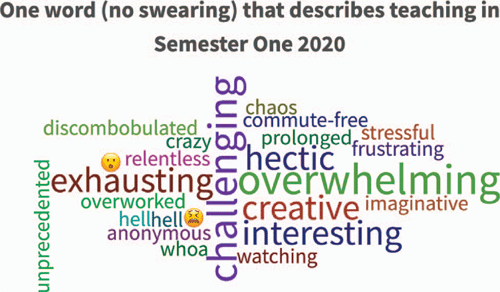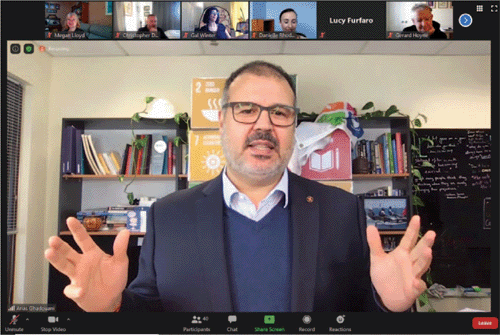ASM Virtual EduCon 2020
Megan LloydUniversity of Western Australia (EdSIG Convenor)
Microbiology Australia 41(3) 163-164 https://doi.org/10.1071/MA20043
Published: 19 August 2020
The first ASM EduCon (Conference of the Education Special Interest Group, EdSIG) was held in Melbourne in 2014 on the weekend before the main ASM meeting. For me, it was transformative and came at the perfect time – I was about to teach my newly minted Medical Microbiology unit and I was very keen to have my theories on microbiology teaching and my proposed unit structure validated by more experienced educators. During EduCon I was introduced to new ideas in teaching and met colleagues who have come to provide both educational and personal support since that first meeting. From the first I was impressed with the collegiate atmosphere and the extreme generosity of the participants with ideas and innovation and truth telling about teaching, and this impression has extended to all EdSIG meetings that I have attended over subsequent years. EduCon has always left me feeling ‘filled up’ with positivity and ready to face the roller coaster ride of the coming semester (don’t stand up till the ride stops moving).
Within 2 years I was helping to organise the meeting in Perth at the new computer labs at the University of Western Australia and in 2020 I fully stepped up to organise EduCon as the new Chair and was deep into planning by February 2020. On 16 March this organisation was completely derailed by the developing COVID-19 pandemic and ASM Executive reluctantly made the decision to cancel the Annual meeting plus all subsidiary meetings.
Like most educators, March and April are a bit of a blur with the rapid development of new modified assessment items and trying to support student learning and at times student welfare whilst also trying to provide authentic learning experiences online. Stress was high, hours worked were outrageous, morale for many educators was low and exhaustion was widespread (Figure 1).

|
In May, when the immediate shock of the first lockdown was subsiding, Priscilla Johanesen contacted me wondering if we could organise a virtual meeting for our teaching academics. What a fantastic suggestion that was! We consulted with Karena Waller (Immediate Past-Chair of the Education Special Interest Group and Chair of the postponed ASM Melbourne meeting) who was supportive and wisely cautioned us that many educators were still very time-poor. So, we decided to run a half-day workshop on the same day as our cancelled meeting and Virtual EduCon or Micro (Education) in the Morning began to take shape. As we moved further towards July, this date also gained significance as lockdown was imposed again on Greater Melbourne and the Mitchell Shire in Victoria – a reminder of our slim grip on controlling SARS-CoV-2 infection.
One of the compelling arguments for organising a virtual meeting was the suggestion (thanks again Priscilla) that by using Zoom (because we are all experts at this now!!) we might be able to bring in an international colleague. So it was that Sue Merkel from Cornell CALS was contacted and agreed to present and run a workshop for us. She spoke about Backwards Design – a process of elaborating on the skills/big concepts that you want your students to leave university with and designing meaningful learning outcomes that are testable, allowing teaching efficacy to be measured. Sue’s use of surveys and breakout rooms demonstrated the capacity of Zoom to provide engaging content and to allow rapid personal connections to be made and her use of Google documents showed off the utility of online collaboration. The breakout rooms were a great way to explore teaching questions and ensured that our conference participants felt comfortable contributing to the discussion. This was a fantastic start to an excellent morning.
Thiru Vanniasinkam from Charles Sturt University followed with insights into unexpected problems faced by a student cohort that were already going to be receiving the bulk of their instruction online. As Thiru described her detective work it emerged that the additional stressors of lockdown had adversely affected student buy-in for her subject, which had resulted in poor virtual attendance in a cohort for whom online attendance was already mandatory. What became evident as the semester progressed was that educators needed to remain responsive to student needs as strategies that were successful at the start did not necessarily work through to the end of the semester. Thiru’s care for her students was evident and her ability to ensure that their learning was appropriate for the accredited course was a great example of intuitive teaching and apposite maintenance of standards.
Chris Deneen from the University of Melbourne spoke about online assessment and picked up a thread that had been running through the previous presentations and subsequent discussion – academic misconduct. Buzz words and strategies touted by many Teaching and Learning specialists such as ‘authentic assessment’, rapidly changing topics and similarity checks are no substitute for knowing your students and appreciating their individual abilities. Whether the carrot or the stick approach is used may depend on the cohort, but we need to discuss academic misconduct with our students and make them understand that it short-changes them as well as their future employers. It is equally important for educators to recognise in this altered reality that the concept of ‘closed book’ assessment should be off the table – we need to provide higher order assessments that test application of knowledge rather than the attainment of facts. This is an opportunity to encourage improved understanding and more complex scientific thinking in our students, and for some of them, this will be a gift.
The brilliant Anas Ghadouani from the University of Western Australia entertained us with his unique exam-free style of student engagement and delivered a passionate thesis that our personalities and passion for our subject are what makes our subjects real for our students (Figure 2). We are the key to unlocking their interest and through this, their application and problem-solving capacity. He left us with a solemn warning that in a world where online learning is now a necessity and may well become the favoured route of cash-strapped universities, it is our passion and our abilities in student engagement that may retain us our jobs.

|
Our final presentation was from Demelza Ireland also from the University of Western Australia who was on real-time holiday but using her newly developed online presentation skills gave her pre-recorded talk from her beautiful garden. She described the development of the School of Biomedical Sciences Community of Practise that met face to face prior to this year – and the rapid evolution of the CoP online as lockdown ensued. Microsoft Teams was used as an information portal and as a conduit of real-time help for lecturers grappling with the new online landscape. The embedding of student opinion seeking in online teaching ensured that students were carried along with the changes that were made to their subject delivery. The inclusion of the scholarship of teaching into the routine discussions had by this CoP was a reminder to educators to use evidence-based teaching practise as commonly as we teach evidence-based science. We are all scientists, let’s approach our teaching in this way too.
Thank you to Monash University for hosting our Zoom. It was a model platform and many of us learnt a lot about its functionality during the meeting.
Thank you to Priscilla for your ability to stay up so late to call me (Victoria’s midnight is a nice easy 10 pm in Perth) and to chat while walking – I know how busy you are and that was a great way to catch up. You were lots of fun to work with, always had fantastic suggestions and did most of the heavy lifting for which I am endlessly grateful.
Thank you to everyone who participated in Virtual EduCon whether it was internationally or across our many Australian time zones (thanks WA folks for going with me on this, 7 am was early!) and to those who popped in and out between Board of Examiners meetings and other academic necessities. Thank you for presenting, discussing, virtual chatting and populating our Google docs. Thank you for your candour, your analytical skills and your passion for continually not being satisfied with what is easy. Thank you for filling us all up ready for the semester 2 rollercoaster. Good luck everyone.


